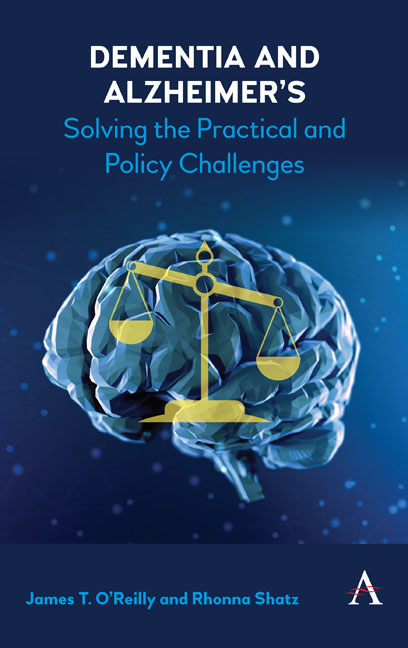Book contents
- Frontmatter
- Contents
- 1 Introduction
- 2 The family dynamics of dementia
- 3 Tort liability related to dementia
- 4 Dementia and private insurance
- 5 Medicare, Medicaid, disability and other government benefits
- 6 Dementia and residential care facilities
- 7 Adult protective services in dementia cases
- 8 Dementia and financial issues
- 9 Dementia in probate and guardianship
- 10 Dementia and employment issues
- 11 Drug research and new product developments for dementia
- 12 Dementia and criminal justice
- 13 Understanding your expert's advice about brain deterioration
- 14 Understanding the causes of Alzheimer's disease
- Appendix: Finding medical reference sources about dementia
- Index
7 - Adult protective services in dementia cases
- Frontmatter
- Contents
- 1 Introduction
- 2 The family dynamics of dementia
- 3 Tort liability related to dementia
- 4 Dementia and private insurance
- 5 Medicare, Medicaid, disability and other government benefits
- 6 Dementia and residential care facilities
- 7 Adult protective services in dementia cases
- 8 Dementia and financial issues
- 9 Dementia in probate and guardianship
- 10 Dementia and employment issues
- 11 Drug research and new product developments for dementia
- 12 Dementia and criminal justice
- 13 Understanding your expert's advice about brain deterioration
- 14 Understanding the causes of Alzheimer's disease
- Appendix: Finding medical reference sources about dementia
- Index
Summary
Protection for dementia patients
Dementia is an isolating condition, one in which the socially active adult gradually experiences a confused fear or withdrawal from active participation in business, family events or other community activities. Sometimes that person needs protection, and our society offers a structure to deliver that protection in the form of “adult protective services.”
Because the person may no longer have a large circle of supportive family and friends, the general community using tax funds provides a “safety net” for the more isolated dementia patients, in the form of state-funded social worker intervention. Adult protective services (APS) steps in to assure that the local probate court will be able to shield the adult from a loss of his or her physical safety. But its intervening role ends when a guardian is appointed by the court and takes over the supervision of the adult patient's care. State legislation gives special powers to the APS workers.
Police who encounter an adult with apparent dementia are the persons most likely to call for APS intervention. The APS mission is to actively respond to the needs of those adults who are otherwise mentally incapable of caring for themselves.
The role of APS is intended to be parallel to the comparable public agency “child protective services” function. Often, the same set of social workers can be housed in the same structure like a unit within the local social services department. APS training is intended to cover the legal action which the workers may take for protection of a dementia patient.
The usefulness of a safety net intervention to protect against harm is decided by the local probate court, the court which has a vital role in appointing guardians, as prescribed in state laws. Most conventional law practice settings do not lead the attorney to interact with APS, and it is likely that a select number of probate specialists in each community have regular interactions with the APS team. Tax funding of the service is a relatively modest corner of local tax expenditures. Federal shared funding for APS is managed through grants from the Administration for Community Living.
- Type
- Chapter
- Information
- Dementia and Alzheimer'sSolving the Practical and Policy Challenges, pp. 45 - 48Publisher: Anthem PressPrint publication year: 2019



